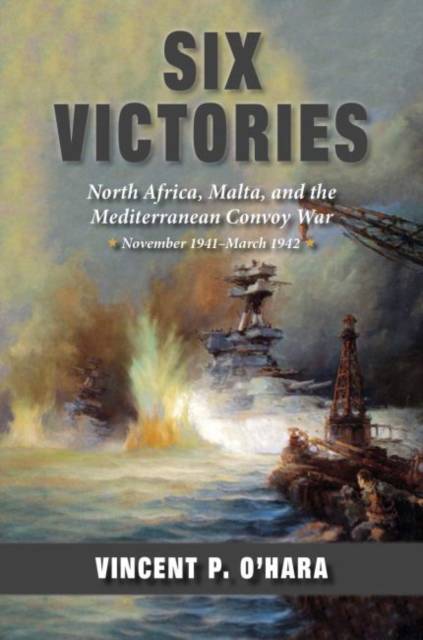
- Afhalen na 1 uur in een winkel met voorraad
- Gratis thuislevering in België vanaf € 30
- Ruim aanbod met 7 miljoen producten
- Afhalen na 1 uur in een winkel met voorraad
- Gratis thuislevering in België vanaf € 30
- Ruim aanbod met 7 miljoen producten
Zoeken
Six Victories
North Africa, Malta, and the Mediterranean Convoy War, November 1941-March 1942
Vincent O'Hara
Hardcover | Engels
€ 41,45
+ 82 punten
Omschrijving
Six Victories examines one of the most interesting and instructive naval campaigns of World War II: the war on traffic in the Mediterranean during the fall and winter of 1941-42. It is a cautionary tale of how sea power was practiced, and how it shifted 180 degrees overnight. Based on British and Italian archival sources, the book emphasizes strategic context, the role of intelligence, and the campaign's logistics. In October 1941 the British Admiralty based a surface strike force in Malta to attack Axis sea lanes between Italy and Africa. Aided by Ultra intelligence, submarines, and bombers based in Malta, this force dominated the Central Mediterranean. From the end of October through the middle of December 1941, less than a third of the supplies shipped from Italian ports arrived in Libya. Shortages of ammunition and fuel finally compelled the Afrika Korps to retreat four hundred miles. Then, in the space of thirty hours, this all changed. First, Italian naval forces broke the blockade by fighting through a major convoy that arrived in time to blunt the British advance; next, the strike force plowed into a minefield laid by Italian cruisers; and finally, in a daring attack, Italian commandos crippled the Mediterranean Fleet's battleships in port. The swing in fortune was immediate and dramatic. Six Victories breaks new ground in the historiography of World War II. A compelling story, it relates lessons that are relevant today and should be required reading for all who practice the art of power at sea and for those who want to understand the intricate and interrelated factors that are the foundations of military success.
Specificaties
Betrokkenen
- Auteur(s):
- Uitgeverij:
Inhoud
- Aantal bladzijden:
- 336
- Taal:
- Engels
Eigenschappen
- Productcode (EAN):
- 9781682474600
- Verschijningsdatum:
- 15/10/2019
- Uitvoering:
- Hardcover
- Formaat:
- Genaaid
- Afmetingen:
- 160 mm x 229 mm
- Gewicht:
- 635 g

Alleen bij Standaard Boekhandel
+ 82 punten op je klantenkaart van Standaard Boekhandel
Beoordelingen
We publiceren alleen reviews die voldoen aan de voorwaarden voor reviews. Bekijk onze voorwaarden voor reviews.











